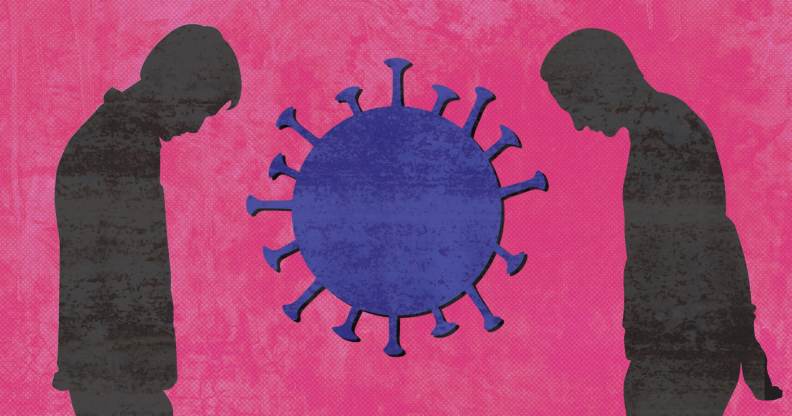Monkeypox: Gay and bisexual men are cutting back on sex to avoid virus, survey shows

The health agency said in a statement on 28 November that both monkeypox and mpox would be used for the next year, while the former name is “phased out”. (PinkNews/Getty)
Gay men are cutting back on sex to avoid monkeypox, a new survey has found.
According to the report published on Friday (26 August) by Kevin Delaney at the US Centers for Disease Control and Prevention (CDC), gay and bisexual men – who are disproportionately affected by monkeypox – have significantly reduced sexual encounters in a multitude of different circumstances.
The survey, between 5 and 15 August, involved 824 US men, 90 per cent of whom admitted to at least one sexual encounter over the past three months.
According to the results, 47.8 per cent had actively reduced their number of sex partners, 49.8 per cent mitigated or outright stopped one-time sexual encounters, while 49.6 per cent reduced their sexual activity with a partner met on a dating app.
A further 42 per cent said they either reduced or outright stopped attending social events either involving sexual activity or close contact.
“These findings suggest that men who have sex with men are already taking actions to protect their sexual health and making decisions to reduce risk to themselves and their partners,” the report read. “Respondents reported changing sexual behaviours since they learned about the monkeypox outbreak.”
To provide context, the CDC report clarified that one-time partnerships – which account for three per cent of daily sexual partnerships among gay and bisexual men and 16 per cent of daily sex acts – are responsible for 50 per cent of daily monkeypox virus transmission.
“A 40 per cent reduction in one-time partnerships might delay the spread of monkeypox and reduce the percentage of persons infected by 20 per cent to 31 per cent,” the report continued.
Interestingly, the report’s findings come at a time when the World Health Organization (WHO) released data stating monkeypox cases dropped by 21 per cent during the week of 15-21 August.
According to data collected by the CDC, on Friday (26 August) the US had at least 17,432 confirmed monkeypox cases, with the majority – 3,291 – reportedly stemming from California.
The disease transmits through skin-to-skin or skin-to-mouth contact with an infected individual. Once infection occurs, symptoms can involve painful lesions across various parts of the body as well as fevers, chills and exhaustion, among other symptoms.
Just 1.7 per cent of the men surveyed had been infected with monkeypox by the end of the survey date. Additionally, 82.3 per cent of men said they felt confident they could protect themselves from the virus.
Still, around 19 per cent of the men said they had got the first dose of the vaccine at least, though 28.5 per cent of those who hadn’t been jabbed said they tried to, but had been unsuccessful for various reasons.
There are global shortages of the Bavarian Nordic monkeypox vaccine, but efforts have been made to increase supplies. The sole, Danish manufacturer of the vaccine is to hand over the production of millions of vaccines to Grand River Aseptic Manufacturing (GRAM) with hopes it will help speed up the delivery of 5.5 million vials to the US.
Finally, the report noted Hispanic men were leading the way in vaccine uptake, with rates at 27.1 per cent. Around 11.5 per cent of those vaccinated were Black, and just under 18 per cent were white. Vaccinations were also more common in the northeast of the country at around 27.8 per cent.

